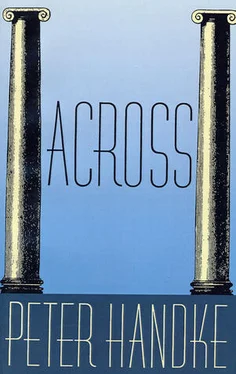Peter Handke - Across
Здесь есть возможность читать онлайн «Peter Handke - Across» весь текст электронной книги совершенно бесплатно (целиком полную версию без сокращений). В некоторых случаях можно слушать аудио, скачать через торрент в формате fb2 и присутствует краткое содержание. Год выпуска: 2000, Издательство: Farrar, Straus and Giroux, Жанр: Современная проза, на английском языке. Описание произведения, (предисловие) а так же отзывы посетителей доступны на портале библиотеки ЛибКат.
- Название:Across
- Автор:
- Издательство:Farrar, Straus and Giroux
- Жанр:
- Год:2000
- ISBN:нет данных
- Рейтинг книги:3 / 5. Голосов: 1
-
Избранное:Добавить в избранное
- Отзывы:
-
Ваша оценка:
- 60
- 1
- 2
- 3
- 4
- 5
Across: краткое содержание, описание и аннотация
Предлагаем к чтению аннотацию, описание, краткое содержание или предисловие (зависит от того, что написал сам автор книги «Across»). Если вы не нашли необходимую информацию о книге — напишите в комментариях, мы постараемся отыскать её.
Across — читать онлайн бесплатно полную книгу (весь текст) целиком
Ниже представлен текст книги, разбитый по страницам. Система сохранения места последней прочитанной страницы, позволяет с удобством читать онлайн бесплатно книгу «Across», без необходимости каждый раз заново искать на чём Вы остановились. Поставьте закладку, и сможете в любой момент перейти на страницу, на которой закончили чтение.
Интервал:
Закладка:
While I waited for the big bells to come back, I conceived an incredible hatred of animals — not so much of birds as of all four- or more-legged animals. The birds with their soaring flight seemed to draw invisible communication lines through the air. But I despised all earthbound animals because, as far as I could see, they gave no thought to any kind of resurrection. They merely huddled, crept, crawled, scurried about, lurked, rutted, or dozed. I almost sympathized with the cruelty of children who kill cats and pull the legs off daddy longlegs.
Yet at the same time it seemed to me that I was reliving the origin of certain Easter rites — when, for instance, I glimpsed the fresh, fleshy white of a horseradish root, dug from deep in the ground; taken together with the lumps of earth clinging to it, that white struck me as a plausible color for life.
All through the weekend I lay stretched out on my bed, incapable of the slightest movement, clenching my teeth and fists, if you can call that lying. Early in the morning, a woman down in the street, who evidently worked in a pastry shop, said: “We’re having a heavy run on Easter eggs.” At noon, the shutters of the supermarket were pulled down for three days. For a long while, in the afternoon, a little bird fluttered up and down outside my window.
With a package tour from somewhere, I landed on the airfield of the moon. From the lobby of the air terminal building, a stairway led down to a restaurant that was jam-packed with Chinese. It was a sinister den, dimly lit and low-ceilinged. In the middle there was a platform — this was the place of slaughter. Naked men with long, curved, two-handed swords flung themselves on other naked but unarmed men. There was no struggle. Nor did the unarmed men run away. They buckled like apes overtaken by a pursuing lion, bared their teeth, and hissed (or rather squeaked) their last cries of terror at the butchers. The soles of the victims’ feet seemed also to buckle and formed high, loudly creaking arches on the platform. A moment later, the whole body was gone. Not only had it been cut into little pieces, but almost simultaneously it had been devoured by the people in the room below. What an instant before had been part of a gesticulating human being was now a chunk of meat vanishing into someone’s gullet. The mouths with these unceasingly active gullets marked, as it were, the innermost core of the Chinese quarter, which at one time had been the hub of all world happening. The slaughter would never end. Time and again, new loads of arms and shoulders were brought in, and in the place of these arms and shoulders there would once again be nothing. We travelers were separated by ropes from the place of slaughter. Bags in hand, we quickly left the airport. The moon was not our final destination; we now went to an elevator at the edge of the airfield, which was to take us back to earth. On the way, we walked under the open sky. Tall acacias rustled in a pale light such as foreshadows a cloudburst. It was not, as one might have expected, easy to walk in the lunar atmosphere — we didn’t hover. From step to step, our limbs grew heavier. I had no difficulty breathing, but felt that I soon would have. It was still a long way to the elevator stop, a windowless, sheet-metal shack, which was ringed by people waiting with suitcases. The only hope was to wake up. But I couldn’t manage to.
At length, the bundle on the bed opened its eyes and sat up. There was a color in the room. It came from the hibiscus plant growing in a large flowerpot next to the wall; a single blossom had opened, carmine against a purple, almost black ground. The pale pink pistil in the middle gleamed like the glass core of a lightbulb, and at the tip were the erect orange-yellow stamens. The flower was within reaching distance, and I held out my hand toward it. I had tried to feel it the day before, but all sense of touch had gone out of my fingers, and I had thought that the still-unfolding flower, as so often with hibiscus flowers, had already shriveled. Now I held a living weight, which cooled my hand and regulated my pulse.
What in the morning had been adulterated by the stench of tomcats now resolved itself into the fragrance of the apples spread out on the shelf. It must have been late afternoon, for the open door of the west room no longer admitted sunshine, but only a deep-yellow glow, in which the hibiscus plant cast on the wall a cloudy shape and within it a few clearly delineated stem shadows. “Late afternoon” reminds me that my son once said it was depressing to keep reading in stories: “At dusk”—it would be better, he thought, to say: “In the late afternoon.” “They arrived in the late afternoon.”
I stood up and looked around; I had never seen a more beautiful room. I bent over the hibiscus blossom. A daddy longlegs was groping its way over the wall, and I addressed it roughly as follows: “Oh. So that’s it. Aha. Hmm. Very well. Good. Why not?”
I took a long shower. Under the warm water, my body gradually grew out of itself. Stationary leg and free-moving leg took form. I took deep swallows of the liquid that would have choked me a few hours before.
In the kitchen, I ate a whole package of zwieback and recalled a saying I had often heard as a child: “Dizziness takes the appetite away.” I had been dizzy for days and now I was hungry. I ate an apple and knew at the first bite that I would go on eating.
Seated at my desk, I put my manuscript, “Thresholds of the Roman Villa,” into an envelope, addressed it, and affixed stamps. Only a short while before, I would have looked on without lifting a finger as every page of it burned or flew out the window. I read a letter from the school principal, who had once been my teacher and later became my friend. In it, he said I was expected back after Easter vacation, that the students had been asking for me, that the undersigned missed me — and not just in his official capacity. A postscript followed: “Please don’t forget that you’re a teacher. Even if your manner isn’t right, you are nevertheless an effective teacher, precisely because you are not entirely of the profession. What enables you to teach is your slight embarrassment, coupled with your total immersion in your subject. There are more than enough competent teachers. But students get the feel of a subject only from those who are at times visibly embarrassed at being teachers, from stutterers and thread-losers. Only such a one remains fixed in the student’s memory as ‘my teacher.’ Quin age . Let us then be up and doing!”
The reader of the letter sat down and wept; not over the praise, but over the salutation, “Dear Andreas,” for it seemed to me that for years no one had called me by my first name.
Still seated, I opened the window. The west wind grazed my neck and temples. In inhaling, I was taken with a violent coughing fit; all those days, I hadn’t once breathed deeply. A horse snorted beside me; that horse was me, as if my nostrils had suddenly grown.
The word “vision” has gone out of fashion. But a vision is just what I had then. I saw the ship of my life, caught in pack ice and already half under water, suddenly rise to the surface and go dancing away. Though the water might be no more than a rivulet and my ship a scrap of paper, perplexity was instantly transformed into a cheerfulness which was anything but caprice and which for the first time could be relied on.
At the same time, though, I realized that the murderous stone I had thrown a few days past marked the beginning of my own death. Since then, there had been something deadly in me, something that could be played down — as I was doing now — but not eradicated. I was no longer in a state of suspense — and my present lightheadedness had grief as its companion. To play down meant power. “Power” meant: “I have time.”
Читать дальшеИнтервал:
Закладка:
Похожие книги на «Across»
Представляем Вашему вниманию похожие книги на «Across» списком для выбора. Мы отобрали схожую по названию и смыслу литературу в надежде предоставить читателям больше вариантов отыскать новые, интересные, ещё непрочитанные произведения.
Обсуждение, отзывы о книге «Across» и просто собственные мнения читателей. Оставьте ваши комментарии, напишите, что Вы думаете о произведении, его смысле или главных героях. Укажите что конкретно понравилось, а что нет, и почему Вы так считаете.












